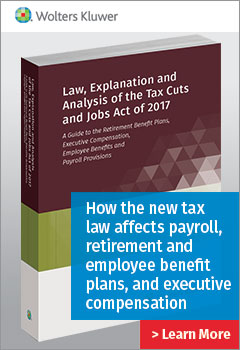| | | | | | |
| | | | |
| | | | |
|
| |
|
|
| |
|
| Products |
Catalog
Featured This Week
Payroll Management Guide
- June 16 marked federal minimum wage's longest period without an increase
- Philadelphia reduces income tax rates
- Employers can offer HRAs integrated with individual coverage
- Nevada law raises minimum wage, guarantees paid sick leave
Unemployment Insurance Reports with Social Security
- Interest rates decrease for third quarter of 2019
- High Court rules AC timeliness dismissal after hearing qualifies as "final decision" for judicial review

Payroll Management Guide
June 16 marked federal minimum wage's longest period without an increase
According to a report by the Economic Policy Institute, June 16 marked the longest period in history without an increase in the federal minimum wage. The last time Congress passed an increase was in May 2007, when it legislated that the minimum wage be raised to $7.25 per hour on July 24, 2009.
Since the minimum wage was first established in 1938, Congress has never let it go unchanged for so long. The Department of Labor's Wage and Hour Division has a chart showing increases from 1938 through 2009.
(Read Cheetah) »
Philadelphia reduces income tax rates
Beginning July 1, 2019, Philadelphia will reduce the rate of the wage tax, earnings tax, net profits tax, and school income tax. All paychecks issued after June 30, 2019 must reflect the new rates.
(Read Cheetah) »
Employers can offer HRAs integrated with individual coverage
The administration has finalized a set of rules enabling employers to use health reimbursement arrangements to reimburse employees for the purchase individual insurance coverage, including coverage on an Affordable Care Act Exchange. The rules also allow "excepted benefit HRAs," which would not have to be integrated with any coverage. The rules generally apply for plan years starting on or after January 1, 2020.
(Read Cheetah) »
Nevada law raises minimum wage, guarantees paid sick leave
Nevada Governor Steve Sisolak signed legislation on June 12 that raise Nevada's minimum wage, guarantee paid sick days for Nevada workers, and secure collective bargaining rights for state employees for the first time in Nevada history.
Assembly Bill 456 raises the state minimum wage by 75 cents each year beginning in 2020, until it reaches $12 per hour, representing the first significant change to the minimum wage in over a decade. The increases will begin on July 1, 2020, when employers who offer employees with qualified health benefit plans will be required to pay employees a minimum of $8 per hour and employers who do not provide health benefits will be required to pay employees a minimum wage of $9 per hour. The state minimum wage has remained at $7.25 per hour for employees offered health insurance and $8.25 per hour if not offered health insurance since July 1, 2010.
(Read Cheetah) »
Unemployment Insurance Reports with Social Security
Interest rates decrease for third quarter of 2019
The Internal Revenue Service has announced that interest rates will decrease for the calendar quarter beginning July 1, 2019. The interest rates are as follows: five percent for overpayments (four percent in the case of a corporation); five percent for underpayments; seven percent for large corporate underpayments; and two-and-one-half percent for the portion of a corporate overpayment exceeding $10,000.
Under the Internal Revenue Code, the rate of interest is determined on a quarterly basis. For taxpayers other than corporations, the overpayment and underpayment rate is the federal short-term rate plus three percentage points. Generally, in the case of a corporation, the underpayment rate is the federal short-term rate plus three percentage points and the overpayment rate is the federal short-term rate plus two percentage points. The rate for large corporate underpayments is the federal short-term rate plus five percentage points. The rate on the portion of a corporate overpayment of tax exceeding $10,000 for a taxable period is the federal short-term rate plus one-half of a percentage point.
(Read Cheetah) »
High Court rules AC timeliness dismissal after hearing qualifies as "final decision" for judicial review
In a unanimous decision, the U.S. Supreme Court in Smith v. Berryhill, No. 17-1606 (2019), found that the Appeals Council's (AC) dismissal of a SSI claimant's request for review on timeliness grounds, after the claimant had a hearing before an Administrative Law Judge (ALJ), qualified as a "final decision" made after a hearing for purposes of allowing judicial review within the context of 42 U.S.C. §405(g). The holding reversed the decision of the Sixth Circuit Court of Appeals, which maintained that there had been no "final decision."
(Read Cheetah) »
|
|
| | | |
Payroll Resources from Wolters Kluwer
About this Newsletter
Payroll and Unemployment Insurance NetNews is a current summary of federal and state employment laws and regulations, compliance issues, and other topics related to proper handling of day to day workplace matters. This timely information comes from the Payroll Management Guide and Unemployment Insurance Reporter with Social Security.
Contact Us
For general questions, contact http://support.cch.com/contact/.
Payroll on Cheetah

Learn More »

|
|
|